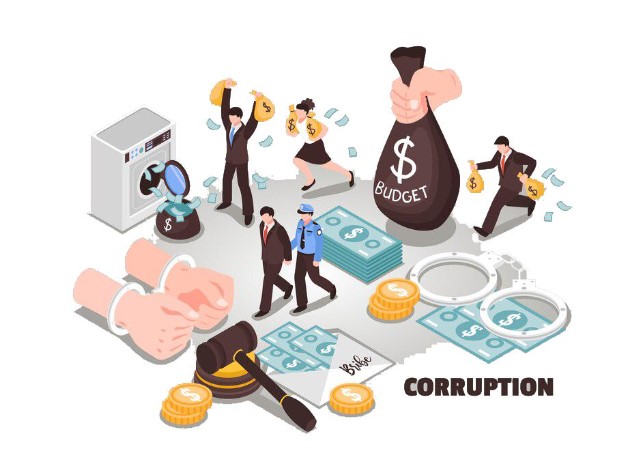“Corruption is a cancer: a cancer that eats away at a citizen’s faith in democracy diminishes the instinct for innovation and creativity, already tight national budgets, crowding out important national investments. It wastes the talent of entire generations. It scares away investments and jobs.”
– Joe Biden.
Corruption is often referred to as a “disease” that plagues nations, hindering their socio-economic development and causing many issues that resonate through various layers of the economy. This blog post aims to unwrap the complex and toxic relationship between corruption and economic performance, shedding light on the immediate and long-term consequences it brings to a country’s financial and social landscape.
Undermining Economic Development
One of the most direct ways corruption impacts the economy is by discouraging foreign investment. Potential investors tend to shy away from countries with high levels of corruption due to the unpredictability it creates and the additional costs it entails. Below is a table demonstrating some typical challenges investors face in corrupt economies:
| Challenge | Description |
| Bribes and Kickbacks | Institutions may require unofficial payments to facilitate business operations, increasing the cost of investment. |
| Red Tape and Bureaucracy | Excessive paperwork and procedures can be a facade for corrupt practices, causing delays and inefficiency. |
| Poor Legal Framework | Laws may be unclear, unenforced, or subject to manipulation, creating a high-risk legal environment for investors. |
Exacerbating Inequality
Corruption often perpetuates income inequality and poverty, as it enables those in power to maintain their positions and wealth at the expense of the general population. This disparity in wealth distribution has profound implications for economic stability and growth.
- Skewed Allocation of Public Funds: Resources might be diverted from essential services, such as education and healthcare, to projects that benefit a select few.
- Corrupt Tax Evasion: Wealthy individuals and businesses may use unethical practices to evade taxes, reducing the government’s ability to fund public services fairly.
- The barrier to Entry: Small and medium-sized enterprises may struggle to compete with larger companies that can afford to pay bribes, stifling competition and innovation.
Eroding Public Trust
When citizens believe their leaders and institutions are corrupt, it can lead to a profound loss of trust. This loss of faith can have ripple effects through the economy by:
- Reducing Tax Compliance: People are less likely to pay taxes if they feel the money will be misused or stolen.
- Stimulating the Informal Economy: Citizens may prefer to conduct business in the informal sector to avoid the corruption present in official channels, thus reducing state revenues and regulations.
- Inciting Political Instability: A lack of public trust can lead to civil unrest and political upheaval, drastically weakening the economy.
Corruption Can Impact Economic Systems in Many Ways
Corruption can have severe and far-reaching consequences on an economy. Here are some of the key ways in which corruption can impact economic systems:
- Reduction in Foreign Direct Investment (FDI): Countries with high levels of corruption often experience a decrease in foreign direct investment. Investors are typically hesitant to invest in environments where corruption is widespread due to concerns about the rule of law, property rights, and the reliability of contracts.
- Distorted Allocation of Resources: Corruption can lead to an inefficient allocation of resources. Instead of allocating resources based on economic considerations such as productivity and efficiency, they may be distributed based on bribery, favoritism, or nepotism, leading to suboptimal outcomes.
- Inefficiency and Poor Public Services: Corruption within government institutions can lead to inefficiency and a decline in the quality of public services. Resources intended for public projects may be misappropriated, resulting in poorly executed infrastructure, healthcare, and education projects.
- Erosion of Trust: Corruption erodes public trust in government institutions and undermines the social contract between citizens and the state. When people perceive that public officials are corrupt, they are less likely to comply with laws, pay taxes, or participate in civic activities, which can hinder economic development.
- Increased Costs for Businesses: Corruption often results in increased costs for businesses, as they may be required to pay bribes to secure contracts, permits, or favorable regulatory treatment. These extra costs can reduce competitiveness and hinder the growth of both domestic and foreign businesses.
- Income Inequality: Corruption can contribute to income inequality by diverting resources from projects that benefit the broader population. When public funds are embezzled or misused, it can exacerbate social and economic disparities.
- Undermining the Rule of Law: A corrupt environment undermines the rule of law, making it difficult for businesses to operate with legal certainty. It can lead to a lack of investor confidence and deter domestic and foreign investment.
- Political Instability: Corruption can contribute to political instability by fostering resentment and dissatisfaction among the population. It can lead to protests, social unrest, and, in extreme cases, political upheaval, harming economic stability and growth.
- Weak Institutions: Corruption weakens the effectiveness of institutions responsible for enforcing laws, regulations, and contracts. It can hinder economic development by creating an environment where the rule of law is not adequately implemented.
Addressing corruption requires a comprehensive approach that includes legal reforms, strengthening institutions, promoting transparency, and fostering a culture of integrity within the public and private sectors. Combating corruption can contribute to a more stable and prosperous economic environment.
Conclusion
In conclusion, corruption is a significant obstacle to economic growth and development. It creates a hostile business environment, exacerbates social inequality, and erodes public trust in governance. Tackling corruption requires a multifaceted approach, including strengthening institutions, improving transparency and accountability, and fostering a culture of integrity. As we continue to acknowledge and understand the deep-seated impacts of corruption on the economy, nations can begin to implement effective strategies to combat this pervasive issue and aid in their journey toward sustainable economic prosperity.



